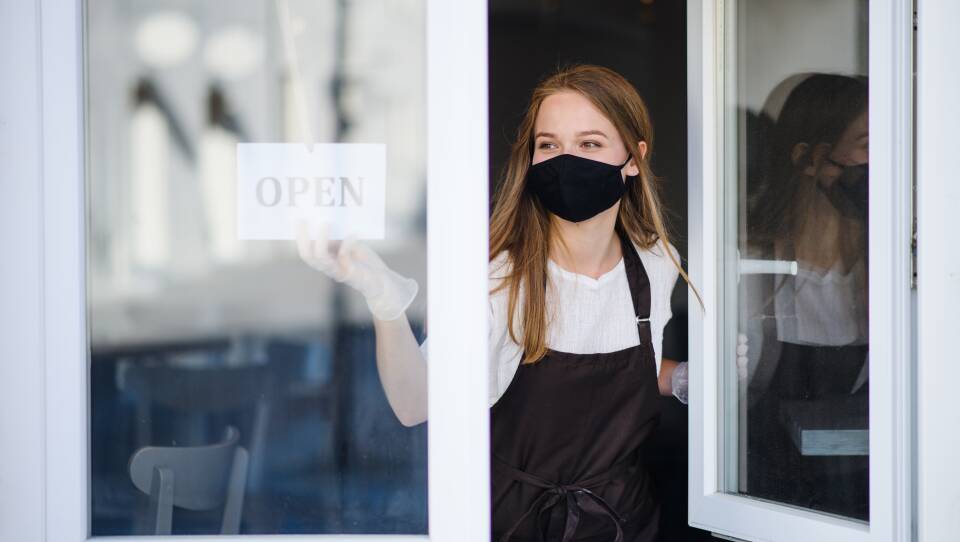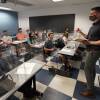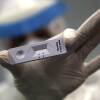The CDC is making a big shift in its pandemic guidelines, saying that those who have been vaccinated against the coronavirus can now take their masks off in most indoor situations. Tufts Medical Center epidemiologist Dr. Shira Doron discussed the move with GBH News reporter Craig LeMoult. This transcript has been edited for clarity.
Craig LeMoult: So a lot of people are undoubtedly thrilled to finally be taking those masks off. What do you think? Is this a wise move on the part of the Centers for Disease Control and Prevention?
Dr. Shira Doron: I do think it is a wise move. It is totally aligned with the science. We know that people who are vaccinated are not at significant risk of acquiring COVID-19 and are particularly protected against severe disease and death, and they don't pose a risk to others. So this is a great move by the CDC.
LeMoult: We've heard so much about the various COVID-19 variants that are still out there and growing. Does that give you any pause when thinking about this decision?
Doron: Well, it's my job to worry about these things. But the studies have really been extremely reassuring when it comes to the efficacy of vaccines, particularly the vaccines that we're using here in the U.S., against all of the variants — even the ones that tend to evade the immune system. So I think that we can still proceed with our loosening of restrictions.
LeMoult: I'll say, I've been still wearing a mask outdoors when I'm just at the park because I'm not going to be fully vaccinated until the end of this month. I have my second shot next week. Would you say I'm being overly cautious here? Can I take that mask off?
Doron: I think you are being overly cautious. In fact, Gov. Charlie Baker's rule is that anyone can be maskless outdoors, provided they're not in a crowd. That is more aligned with the science. Outdoors is extremely safe. There's such good ventilation — the best ventilation — that even vaccinated or unvaccinated individuals are very safe outside without a mask on.
LeMoult: A lot of people in the state are vaccinated now, but certainly not everybody. Are you worried that this CDC call to lift the mask mandate for those who have been vaccinated could inspire those who haven't to go without masks when they're indoors?
Doron: I think there are likely two parts to the decision made by the CDC. One certainly was to inspire people, to incentivize them to be vaccinated if they aren't already. There have been polls which have suggested that some people do need incentives — whether it's a donut, or a beer, or being allowed to remove their mask. And so every additional person vaccinated is really good for public health. The other part is that it does make sense from a scientific standpoint. People who are vaccinated can really resume nearly all of the activities that they were used to pre-pandemic.
I think the confusing part, and I think it'll be really interesting to see how the Baker administration handles this, is that when you're inside in, say, a business setting, we don't know who's vaccinated and who's unvaccinated. However, at this point, those who are unvaccinated, for the most part, if they decide to take off their mask, they're only posing a risk to themselves, not the vaccinated people in that setting.
LeMoult: But aren't they also posing a risk to other unvaccinated people in that room? I think there are some parents out there who are maybe worried about taking their kids, those under the age of 12 who can't get vaccinated yet, into indoor public spaces. If people aren't wearing masks, there's no way to know, as you said, if they're vaccinated. I think there are other people who can't get vaccinated for other reasons, medical reasons and things like that. Are they putting those people at risk?
Doron: Absolutely, there is a concern there. Now, everyone should feel free to wear a mask whenever and wherever they want. If you are unvaccinated or immunocompromised, even if vaccinated, you should continue to take precautions. Now, there are parts of the country — remember, the CDC makes recommendations for the country as a whole — and there are many parts of the country now where infection rates are so low that it would not matter if unvaccinated people took off their masks indoors, because the chance that they have COVID-19 is so, so small.
Here in the northeast, there's still a fair amount of COVID-19. So I must admit, I'm a little bit surprised that this came out now. We're not really at a point where we can say everyone who wants a vaccine has had a chance to get it and get to the end of that two-week, post-second dose period. I think we're probably there by around June 15, about a month from now, here in Massachusetts, if you look at when we opened up walk-in clinics, which is really when it became widely available. By that point, though, then it really does become kind of a personal decision.
But you are right, if there's still a lot of COVID-19 at that time, and I think there will be a lot less, there is that risk that somebody who's unvaccinated could acquire COVID-19.
LeMoult: In terms of the timing, it was only this week really that some children became eligible to get the vaccine. So does it seem a little soon because of that?
Doron: Obviously children are much, much lower risk of severe disease and death from COVID-19 — very, very small risk. There is going to be a continued decline in cases. That's the expectation. That's what the CDC models show. And by July, there will be very, very little COVID circulating in the community. So at some point this summer, it's going to be very safe for both vaccinated and unvaccinated people to be in indoor spaces without masks and distancing.
LeMoult: Do you think this could actually inspire people who may be hesitant about getting the vaccine to go ahead and get it because it means that now they can be in public indoors without masks?
Doron: That's the hope, and I think the survey results suggest that may actually be true.
LeMoult: Do you think this guidance should apply to all indoor spaces? I mean, it's one thing to go without a mask in a well-ventilated building with not a lot of people. But what about crowded bars or indoor sports stadiums, places like that?
Doron: Well, you know, again, if you really followed it to the letter of the law and vaccinated people were the only ones who went to unmask, it could apply anywhere. I think that it makes sense. And there are some exceptions listed ino this new recommendation — public transportation, hospitals, homeless shelters. There are some places where they still recommend mask wearing. But I think part of that is really this inability to know who's vaccinated and who's not vaccinated, and the possibility that unvaccinated people might choose to shed their mask, as well.
LeMoult: Even with this new guidance, are there circumstances, places in everyday life, where you think you'll still be wearing your mask indoors?
Doron: I'm so taken aback by this day that I haven't even really thought about that. That's a great question. You know, I think that to me, the social norms are very important. I don't want people to feel uncomfortable by whatever I do, and so I think in close quarters, when I'm with people that don't know whether I'm vaccinated or not, that's probably when I would choose to wear a mask.









